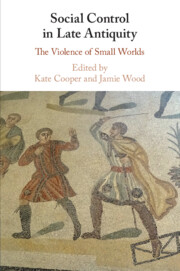Book contents
- Social Control in Late Antiquity
- Social Control in Late Antiquity
- Copyright page
- Contents
- Contributors
- Preface and Acknowledgements
- Abbreviations
- Introduction
- Part I Women and Children First
- Chapter 1 Female Crime and Female Confinement in Late Antiquity
- Chapter 2 Holy Beatings
- Chapter 3 Power, Faith, and Reciprocity in a Slave Society
- Chapter 4 A Predator and a Gentleman
- Part II ‘Slaves, be subject to your masters’
- Part III Knowledge, Power, and Symbolic Violence
- Part IV Vulnerability and Power
- Bibliography
- Index
Chapter 2 - Holy Beatings
Emmelia, Her Son Gregory of Nyssa, and the Forty Martyrs of Sebasteia
from Part I - Women and Children First
Published online by Cambridge University Press: 18 September 2020
- Social Control in Late Antiquity
- Social Control in Late Antiquity
- Copyright page
- Contents
- Contributors
- Preface and Acknowledgements
- Abbreviations
- Introduction
- Part I Women and Children First
- Chapter 1 Female Crime and Female Confinement in Late Antiquity
- Chapter 2 Holy Beatings
- Chapter 3 Power, Faith, and Reciprocity in a Slave Society
- Chapter 4 A Predator and a Gentleman
- Part II ‘Slaves, be subject to your masters’
- Part III Knowledge, Power, and Symbolic Violence
- Part IV Vulnerability and Power
- Bibliography
- Index
Summary
In Encomium in xl martyres ii, Gregory of Nyssa relates a violent biographical incident that was life changing. When Gregory was an adolescent, his mother, Emmelia, commissioned the building of a martyrium in Ibora, for the Forty Martyrs. Emmelia asked Gregory to accompany her to the inaugural festival. Gregory went grudgingly. Once there, his lax behaviour earned him a visit from the Forty Martyrs, during which they beat him. This chapter examines the violent episode from three perspectives. First is the discussion of what ‘acceptable’ violence is within the household of an elite Cappadocian family in the fourth century. Late Roman family law informs an examination of the tension and resolution between Emmelia and Gregory, as mother and son. Next, what valence Gregory gives this traumatic event is explored with regard to his familial history. Both were extremely important to Gregory and inextricably bound up with the Forty Martyrs. The chapter ends with an analysis of the startling ways Gregory employs the beating in the sermon, both to reify his family as kin to the martyrs, and to promote imitation of the martyrs among the faithful. The particular consequences of family violence upon Gregory as an elite Cappadocian Christian thus unfold.
- Type
- Chapter
- Information
- Social Control in Late AntiquityThe Violence of Small Worlds, pp. 39 - 58Publisher: Cambridge University PressPrint publication year: 2020
- 1
- Cited by

